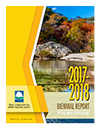Agency Activities: Environmental Assistance (FY2017-2018)
The following summarizes the agency’s activities regarding voluntary programs and renewing old and surplus materials. (Part of Chapter 2—Biennial Report to the 86th Legislature, FY2017-FY2018)
Environmental Assistance
Voluntary Programs
The TCEQ uses technical assistance, education, and pollution prevention programs to encourage environmental improvements. The Environmental Assistance Division (EAD) steers many of these programs in a direction that focuses on agency priorities and aligns with agency regulatory systems.
In fiscal 2017 and 2018, the division responded to 16,857 requests for assistance from small businesses and local governments. Of those, 597 received one-on-one assistance at their business site or facility.
For fiscal 2017, the EAD’s Site Visit program continued to focus resources on the requirements of the federal Energy Policy Act. Under that act, all registered petroleum storage tanks must undergo an investigation at least once every three years. Through the Site Visit Program, PST facilities have an opportunity to receive an Energy Policy Act site visit. If they achieve full compliance with the Energy Policy Act’s checklist, they receive credit for their three-year investigation. Site visits do not lead to an investigation or citation, unless there is an imminent threat to human health or the environment.
In fiscal 2017, 162 site visits occurred, resulting in 114 Energy Act compliant facilities. Those facilities that were not compliant received recommendations for resolving non-compliance issues so that they can prepare for a future investigation under the Energy Policy Act.
At the end of fiscal 2017, after Hurricane Harvey made landfall on the Texas Coast, the Site Visit Program once again was repurposed for fiscal 2018 to provide damage-assessment site visits to PST facilities in the areas most affected by Harvey. At the beginning of fiscal 2018, the Site Visit Program completed 589 damage-assessment site visits at facilities located in the Houston, Beaumont, and Corpus Christi regions. Additionally, the EAD sent letters to the 8,053 PST facilities in the affected counties requesting that they submit an online survey reporting damage sustained from Harvey. A total of 1,106 PST facilities submitted online damage-assessment surveys. Combined, 136 facilities sustained PST system damage from Hurricane Harvey, primarily wind and water damage to canopies and fuel dispensers.
In March of 2017, the TCEQ adopted rules to be consistent with the federal Revised Total Coliform Rule (RTCR) and to maintain primacy over the Public Drinking Water System Supervision Program in Texas. Outreach was conducted by the EAD in conjunction with the Water Supply Division. In fiscal 2017, workshops were held in San Angelo, Laredo, Corpus Christi, Wichita Falls and Amarillo. In total, the workshops had 213 attendees, of which 154 were licensed operators, representing 118 unique PWSs. In fiscal 2018, workshops were completed in Beaumont, Tyler (2), Ft. Worth (2), Frisco, Houston, Rosenberg, Dallas, and Corpus Christi. In total, the workshops had 391 attendees, of which 370 were licensed operators, representing 261 unique PWSs.
The TCEQ also offers educational opportunities and technical assistance through coordinated workshops, seminars, and education events, including the annual Environmental Trade Fair and Conference held in downtown Austin. During the last two years, the agency sponsored 14 seminars to provide technical information to almost 13,300 attendees.
For larger organizations such as refineries, universities, and municipal utility districts, the TCEQ offered technical advice on innovative approaches for improving environmental performance through pollution prevention planning.
All together, these efforts resulted in reductions of hazardous waste by more than 2.5 million tons and toxic chemicals by about 698,365 tons during fiscal biennium 2017–18.
Renewing Old and Surplus Materials
Texas established the Resource Exchange Network for Eliminating Waste (RENEW) in 1988 to promote the reuse or recycling of industrial waste.
The materials-exchange network has assisted in the trading of millions of pounds of materials, including plastic, wood, and laboratory chemicals. These exchanges divert materials from landfills and help participants reduce waste-disposal costs and receive money for their surplus materials. Additionally, exchanges help protect the environment by conserving natural resources and reducing waste.
RENEW is a free, easy-to-use service. Listings are grouped under “Materials Available” for anyone offering raw materials to other facilities, and “Materials Wanted” for anyone looking to find raw materials.
Through the RENEW website, <www.renewtx.org >, these participants can list and promote information on opportunities for exchanging at national and regional levels.
In fiscal 2017 and 2018, 178 users signed up to use RENEW, and 221 new listings were posted.

